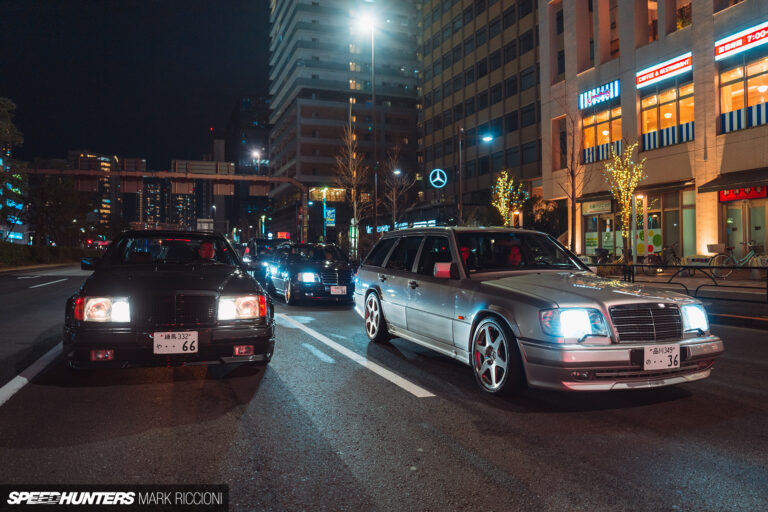If I ask you to describe an E36 from the 1990s, you’re almost guaranteed to begin with the letters B, M and W.
But what if I were to tell you there was an actual model called the E36 from a German manufacturer? Confused? Well, let me help you out. Take off your Lederhosen, we’re not in Bavaria anymore.
Instead we’re looking back to 1993 Affalterbach, home of Mercedes-Benz tuners AMG, where you’d find 124-generation E-Classes in various shapes and sizes.
Side note: You’ll also find some of the clunkiest model names ever invented.

And by various shapes and sizes, I do mean just that. If you’re lucky, you might have seen a wide-body 300 CE 6.0 ‘Hammer’ coupé in for work. Maybe a freshly-released E 500 AMG facelift super saloon, too. If you wanted something smaller and rowdier, the W201 190 E 3.2 AMG was still available as a conversion in ’93 as the W202 C36 AMG was launched.

But if you fancied something a little more understated, maybe a little more practical, then an S124 E36 AMG Wagon would be the car for you.

What makes an E36 AMG special you may ask? Well, being an AMG product the power-hungry maniacs couldn’t have left the engine alone. Based on a 2.8L M104 six-cylinder engine, AMG engineers would tear it down and bore it out by 2.1mm, which combined with a crankshaft from a 3.5L OM603 engine took the displacement out to 3,606cc. That’s 3.6L with a compression ratio of 10.5:1.

This was combined with an AMG-specific intake cam and cylinder head honing, as well as a freer flowing intake crossover pipe and exhaust system. A tweaked ECU made the most of the modifications.

The engine was designated the M104.991 and the power output jumped to anywhere between the official 276hp, to as high as 287hp. AMG argues that there was a little room for error given the modifications were made by hand, but if you factor in Japan’s ‘gentleman’s agreement’ which limited power output to 280PS (276hp), that’s a very convenient margin to have if you wanted to stay ahead of the competition.

Hajime Yuki’s silver example that you see here has been in his ownership for 15 years, and he’s about as devoted an enthusiast as possible.
“I purchased my current Brilliant Silver E36 in 2009, but I was also driving another S124 before that,” explained Yuki-san. “I go skiing and camping with my family, so I wanted a vehicle that was powerful, fast and practical enough to carry luggage for us all.”

“The E36 AMG was sold in Japan in 1994 and 1995. The ’94 model is equipped with urethane fender extensions, and the ’95 model is equipped with rubber ones.” These fender extensions are unique to original Japanese market cars, in addition to the AMG-embossed ashtray, scuff plate and even the rear glass.
Yuki-san added: “I’ve always been a Mercedes-Benz fan. My son’s been in S124s since the day he was born, and now he works at an official Mercedes-Benz dealership.”


Combined with a set of AMG-specific 25mm lowering springs, deeper front bumper, aerodynamic side rocker panels and the deeper rear bumper, the E36 AMG not only has a more aggressive stance than its non-sporting stablemates, but has a much slipperier shape – a drag coefficient of 0.25 versus 0.34. Let’s not forget the fantastic AMG monoblock wheels, either.
“Very few units were officially sold in Japan, 13 of 1994 model. Only 35 units of the 1995 model exist. My 1994 model E36 AMG is one of the original 13 cars,” said Yuki-san.

“I’d been looking for an E36 AMG for years, but they rarely came on the market. My E36 AMG happened to appear on the market on the same day that my Sportsline S124 was involved in an accident. All I can say is that it was fate!”
It’s said that you can measure somebody’s personality by the company they keep. Considering that Yuki-san’s friends tagged along for the shoot in both another E36 AMG on Ronal ACT split rims and a wide body C124 AMG rolling on OZ Futuras, it’s safe to say that he’s an enthusiast of impeccable taste.
Mario Christou
Instagram: mcwpn
Photography by Mark Riccioni
Instagram: mark_scenemedia
Twitter/X: markriccioni
mark@speedhunters.com









